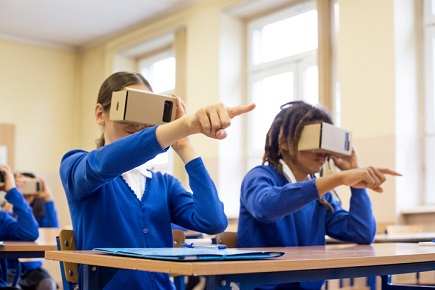
A new report has called on educators to further develop AI education to help prepare students for the workplace once they leave school.
The report – commissioned by the Federal Government and authored by a group of Newcastle researchers – examined the literature, and provide advice to teachers, on AI and other emerging technologies, such as virtual, augmented and mixed reality) in schools.
Teachers provided a number of case studies on AI and VR that illustrate the practical aspects of introducing the technology into classrooms, how to use them effectively for learning and how to teach students about them.
Among the case studies were Ravenswood School for Girls, Toongabbie Christian College, Callaghan College, Dungog High School and Mossman State High School.
“The participants in the national consultation offered rich insights into the potential and risks associated with implementing and scaling up AI and emerging technologies in schools,” the report’s authors wrote.
“They emphasised that now was the time to begin very serious consideration of curriculum and pedagogical potential and to engage and educate teachers on the technologies, especially AI and the ethical complications associated with it.”
Humanising AI
One of the case studies highlighted was Ravenswood School for Girls. The school has introduced the topic of AI to Year 6 primary school students in a way that lets them see AI as fun, not scary, and something students will want to continue learning about in the future
The program unfolded over 2-3 lessons of about 50 minutes, with the main goals of the course being for students to understand how robots learn and if there were similarities between the way humans learn compared to robots.
The practical component of the course was to try to teach a LEGO EV3 robot to play the game of lawn bowls.
The project aligned with the digital technologies strand of the NESA Science and Technology curriculum as students were tasked with defining a problem and designing a digital solution that incorporates algorithms.
The advice from teachers was for schools to think critically about the technology resources they have and how they can use these resources to enable deep learning to happen.
“Refer to the SAMR11 model for technology integration when planning new learning
to decide on the level of integration the technology is achieving,” the teachers wrote.
“Always try to link your tasks to authentic, real-world situations to make the learning more purposeful and meaningful.”
Students use VR to develop a city
Another project – by Toongabbie Christian College (conducted at William Clarke College) – asked students to create and present a plan for how an Australian city or suburb could be further developed to maximise economic, environmental and social sustainability.
The task was unique in that students needed to present their plans through a Virtual Reality (VR) tour utilising a new program called Story Spheres offered by Google in early 2017.
“The small nuggets of wisdom that I can provide having created and implement such a task is to firstly, take the initial risk,” the feedback from the school’s teachers stated.
“If you fail, try a different approach and know that persistence is key with integrating emerging technologies. ‘Dogfooding’ or trialing your own task is a must to ensure that all components work whether it be the program or instructions.”
The teachers advised constantly keep an eye out for new and improved programs or technologies which make the task easier to complete.
“Finally, ensure that students have a model to help them understand the expectation of their final product,” they wrote.
Technologies must be ‘carefully incubated’
The authors of the report, in their concluding remarks, said AI and emerging technologies need to be carefully ‘incubated’ in a controlled way in a diverse range of school settings, including rural and low-income school communities, in order to identify practical, safety, ethical and technical issues.
“This ‘incubation’ must be accompanied by robust, theoretically informed research on their pedagogical potential and impacts of the technologies on learners and learning,” they wrote.
Most pressing, said the report’s authors, is the need “to identify what teachers need to know in order to begin to develop a foundational understanding about AI and emerging technologies”.
“This is the starting point for the development of quality professional learning on the technologies and for ensuring that initial teacher education programs equip future teachers with this foundational knowledge.”


